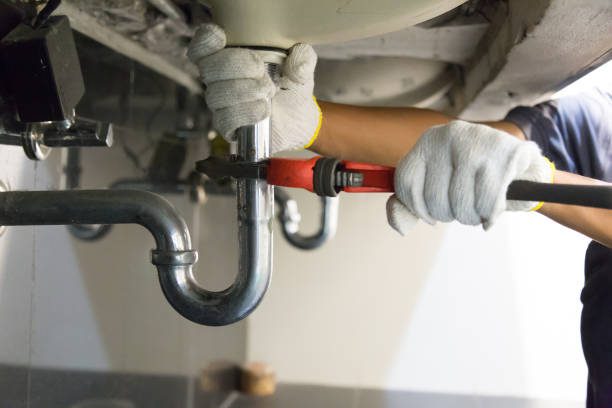
30 Sep Easy Kitchen Plumbing Tips for Everyone in Tyler, TX
 You don’t have to be a do-it-yourself expert in Tyler, TX to use kitchen plumbing maintenance techniques. You can keep your kitchen in good working order without professional plumbing help. So, changing just a few of your habits can help you have a kitchen plumbing system that works smoothly and is less of a drain on your pocket. This article will discuss kitchen plumbing tips that everyone in your household can use. Here are 8 easy plumbing tips for everyone in Tyler, TX.
You don’t have to be a do-it-yourself expert in Tyler, TX to use kitchen plumbing maintenance techniques. You can keep your kitchen in good working order without professional plumbing help. So, changing just a few of your habits can help you have a kitchen plumbing system that works smoothly and is less of a drain on your pocket. This article will discuss kitchen plumbing tips that everyone in your household can use. Here are 8 easy plumbing tips for everyone in Tyler, TX.
1. Always Know Where Your Shut-Off Valves are Located
As soon as you move into a new house or apartment, find out where the shut-off valves are located. At any point, you might end up with a leak, or some other type of emergency may occur, and you’ll need to shut off the water quickly.
When you know where to find the shut-off valve, you can prevent flooding and damage to your property. Just a few minutes of frantic searching can increase stress and leave water everywhere. If you live in an apartment building, you may not have access to a lock-off in your home, but there are usually lock-offs under the kitchen sink and at other points if you live in a house.
Every member of your household who is old enough to understand and be helpful in an emergency should know how to find shut-off valves. Younger children can be taught not to play with the valves or tamper with them in any way. Show your older children how to turn the valves on and off.
2. Use Drain Covers in your Kitchen Sink
Drain covers keep bits of food from entering the drain and causing clogs. However, even if you only rinse your hands at the sink every day, it’s possible that tiny particles of food can enter the drain if a drain cover isn’t there to trap them before that can occur.
Without a drain cover, everything that enters the drain will become a problem further down the line. This will occur at a point where it’s not as easy for you to remove it. So it’s better to nip problems in the bud early at the point where you can easily access the particles before they can become an issue.
3. Don’t Pour Cooking Oil Down the Drain
You should never pour cooking oil down your drain. For example, if you have a little oil in your frying pan, don’t pour any of it down your kitchen drain, even after you’ve used dish soap to break it up.
Cooking oil will solidify further down your drain. Over time, this helps to create a clog. However, that clog will be so far down your drain that it will be difficult for you to break it up by using a kitchen plunger.
Train all of your children to completely remove grease from your pots, pans, and plates before washing them in the kitchen sink. In addition, no grease of any kind should be allowed to enter your kitchen drains. This includes animal fats and vegetable fats such as margarine.
4. Keep A Kitchen Plunger Handy
Kitchen plungers are lifesavers when your sink is slightly clogged. Just a few determined plunges can help to free up a clogged drain. The soothing release that you’ll feel as water flows down the drain is memorable. So invest in a good quality kitchen plunger and keep it handy at all times.
It may be a good idea to regularly plunge your kitchen sink to keep it free of any temporary clogs. Some may be forming that you haven’t noticed. In addition, this type of regular kitchen plumbing maintenance can help to remove bits of fat and other particles such as coffee grounds that escaped the drain cover and may have gotten stuck along the inner surface of the drain.
5. Use Hot Water to Clear your Drain After Washing Dishes
Whenever you finish washing your dishes, run hot water down the drain for 15 to 20 seconds afterward. Doing so helps keep the oil in a liquid form long enough to exit your drain entirely. Once a line is clear, there won’t be any danger of the liquid oil becoming solid and blocking your drain at some point.
It’s not enough to simply run water down the line after your dishes are clean. While running water at room temperature can help, it’s not the same as using hot water. Hot water changes the oil from a solid state to a liquid. This allows it to flow freely out of your drain.
6. Use Environmentally-Friendly Chemicals to Clear Clogs
If your kitchen sink is clogged and you’ve already plunged it without seeing any results, you might think of using a corrosive agent to clear the clog. However, it’s important to avoid using corrosive chemicals in your kitchen sink as much as possible.
Corrosive chemicals can damage the pipes, leading to further problems down the road. So always aim to use environmentally-friendly chemicals to clean your sink and clear any clogs if they develop.
7. Fix Leaks Promptly
If you hear the sound of dripping under your sink or you notice a leak from a faucet, try to fix it as soon as possible. What seems like a small leak can cause significant problems for you in the long term.
A small leak wastes gallons of water each day. Delaying this kind of kitchen plumbing maintenance increases your water bill significantly. You would have more spending money available if cash weren’t being used to pay for water lost due to leaks.
Dripping under your sink can also cause damage to everything around it. You may even have to do mold remediation if these leaks aren’t fixed as soon as you can get to them. So make it a priority on your to-do list and avoid extra work later on.
8. Use Plumber’s Tape around Fittings
Plumber’s tape is also known as Teflon tape or threading tape. It’s used around joints to help improve the seal. It’s good always to have a roll of this handy, and it’s usually very affordable. It’s cheaper for you to wind plumber’s tape around each joint two or three times and ensure that the joint is sealed than not to use it and end up having to deal with a leak.
If you are in Tyler Texas in need of plumbing assistance, please don’t hesitate to call one of our representatives.

